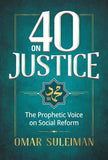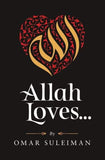-10%
Zoom the image with mouse
40 On Justice by Omar Suleiman
6 In stock
RM89.10
RM99.00
customers are viewing this product

40 ON JUSTICE
PROPHET MUHAMMAD’S MESSAGE TO HUMANITY
Author: Omar Suleiman
Publisher: Kube Publishing
Year Published: September 2020
Language: English
Genre: Motivational
ISBN: 9781847741431
Pages: 160
Format: Paperback
Weight: 0.4kg
A collection of 40 Hadith (sayings) of the Prophet Muhammad (pbuh) focusing on the notion of social justice in Islam.
Justice is essential to the survival and flourishing of any civilization. The words of God and His Messenger (pbuh) remind us of the centrality of justice in our lives and our societies.
This unique commentary on forty hadith narrated from the Prophet Muhammad (pbuh) explores Islamic teachings regarding social justice. It covers a wide variety of topics ranging from the environment, racism, family realtions, the rights of the elderly, the disabled, and humanity more generally.
This book will take you on a journey through Islam's rich heritage and the guidance it provides us to confront injustices in our socities today.
PROPHET MUHAMMAD’S MESSAGE TO HUMANITY
Author: Omar Suleiman
Publisher: Kube Publishing
Year Published: September 2020
Language: English
Genre: Motivational
ISBN: 9781847741431
Pages: 160
Format: Paperback
Weight: 0.4kg
A collection of 40 Hadith (sayings) of the Prophet Muhammad (pbuh) focusing on the notion of social justice in Islam.
Justice is essential to the survival and flourishing of any civilization. The words of God and His Messenger (pbuh) remind us of the centrality of justice in our lives and our societies.
This unique commentary on forty hadith narrated from the Prophet Muhammad (pbuh) explores Islamic teachings regarding social justice. It covers a wide variety of topics ranging from the environment, racism, family realtions, the rights of the elderly, the disabled, and humanity more generally.
This book will take you on a journey through Islam's rich heritage and the guidance it provides us to confront injustices in our socities today.
Polisi Order:
1. Sebarang order yang berjaya adalah muktamad dan tidak boleh dibatalkan atau ditukar ganti.
2. Selepas selesai proses pembayaran yang lengkap, anda akan menerima email pengesahan daripada IMAN Shoppe Bookstore bersama nombor order (cth: #111***). No order ini penting untuk semakan keseluruhan butiran pembelian.
3. Untuk membuat semakan order yang telah dibuat, anda perlu sign in account untuk melihat history pembelian yang telah anda lakukan di www.imanshoppe.com.
4. Anda tidak dibenarkan menukar atau menambah order selepas pembelian berjaya di website. Untuk menambah pembelian buku, anda boleh membuat tempahan buku yang baru di website dan kami akan pos buku tersebut secara berasingan.
Polisi Penghantaran:
1. Penghantaran buku akan dilakukan dalam masa 2-3 hari, luar negara akan mengambil masa dalam 2-3 minggu tidak termasuk hari Sabtu dan Ahad mengikut nombor order (cth: #111***).
2. Semua parcel akan diposkan melalui sistem kurier yang telah ditetapkan oleh pihak IMAN kecuali Sabah Sarawak dan Luar Negara.
3. Tracking nombor akan diberikan melalui SMS dan email dari Easyparcel setelah parcel mula diproses oleh pihak IMAN.
4. Untuk servis self pickup dan pembelian secara walk in buku akan mula diproses dalam masa 24 jam selepas order di website. Anda boleh pick up semasa waktu bekerja Isnin - Jumaat (12 tengah hari - 5.00 petang)
Polisi Kerosakan/Kehilangan Parcel
1. Sebarang aduan seperti berikut:
i. Kerosakan item
ii. Menerima order yang salah
iii. Kelewatan atau kehilangan parce
Anda boleh membuat laporan kepada Unit Khidmat Pelanggan IMAN di sini. Pihak IMAN akan segera hubungi anda melalui email dalam tempoh 24 jam semasa waktu bekerja untuk penghantaran item yang baru.
Perhatian: Untuk buku rosak atau salah item, anda tidak perlu pulangkan kepada pihak IMAN.
2. Jika parcel mengalami kerosakan fizikal, anda perlu membuat laporan kepada pihak Easyparcel melalui email, support@easyparcel.my dan pihak IMAN dalam masa 24 jam. Kami tidak akan menghantar parcel yang baru sekiranya anda tidak membuat laporan kepada pihak kurier.
3. Untuk kes pemulangan parcel yang tak dituntut, anda haruslah membayar kos penghantaran yang baru kepada pihak IMAN dalam tempoh sebulan.
PERHATIAN: Sebarang persoalan dan cadangan, boleh diajukan kepada Unit Khidmat Pelanggan IMAN melalui email sales@imanshoppe.com atau hubungi talian 013-2875747.
1. Sebarang order yang berjaya adalah muktamad dan tidak boleh dibatalkan atau ditukar ganti.
2. Selepas selesai proses pembayaran yang lengkap, anda akan menerima email pengesahan daripada IMAN Shoppe Bookstore bersama nombor order (cth: #111***). No order ini penting untuk semakan keseluruhan butiran pembelian.
3. Untuk membuat semakan order yang telah dibuat, anda perlu sign in account untuk melihat history pembelian yang telah anda lakukan di www.imanshoppe.com.
4. Anda tidak dibenarkan menukar atau menambah order selepas pembelian berjaya di website. Untuk menambah pembelian buku, anda boleh membuat tempahan buku yang baru di website dan kami akan pos buku tersebut secara berasingan.
Polisi Penghantaran:
1. Penghantaran buku akan dilakukan dalam masa 2-3 hari, luar negara akan mengambil masa dalam 2-3 minggu tidak termasuk hari Sabtu dan Ahad mengikut nombor order (cth: #111***).
2. Semua parcel akan diposkan melalui sistem kurier yang telah ditetapkan oleh pihak IMAN kecuali Sabah Sarawak dan Luar Negara.
3. Tracking nombor akan diberikan melalui SMS dan email dari Easyparcel setelah parcel mula diproses oleh pihak IMAN.
4. Untuk servis self pickup dan pembelian secara walk in buku akan mula diproses dalam masa 24 jam selepas order di website. Anda boleh pick up semasa waktu bekerja Isnin - Jumaat (12 tengah hari - 5.00 petang)
Polisi Kerosakan/Kehilangan Parcel
1. Sebarang aduan seperti berikut:
i. Kerosakan item
ii. Menerima order yang salah
iii. Kelewatan atau kehilangan parce
Anda boleh membuat laporan kepada Unit Khidmat Pelanggan IMAN di sini. Pihak IMAN akan segera hubungi anda melalui email dalam tempoh 24 jam semasa waktu bekerja untuk penghantaran item yang baru.
Perhatian: Untuk buku rosak atau salah item, anda tidak perlu pulangkan kepada pihak IMAN.
2. Jika parcel mengalami kerosakan fizikal, anda perlu membuat laporan kepada pihak Easyparcel melalui email, support@easyparcel.my dan pihak IMAN dalam masa 24 jam. Kami tidak akan menghantar parcel yang baru sekiranya anda tidak membuat laporan kepada pihak kurier.
3. Untuk kes pemulangan parcel yang tak dituntut, anda haruslah membayar kos penghantaran yang baru kepada pihak IMAN dalam tempoh sebulan.
PERHATIAN: Sebarang persoalan dan cadangan, boleh diajukan kepada Unit Khidmat Pelanggan IMAN melalui email sales@imanshoppe.com atau hubungi talian 013-2875747.












